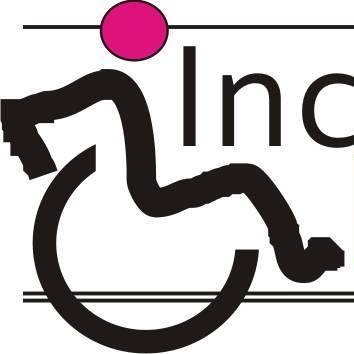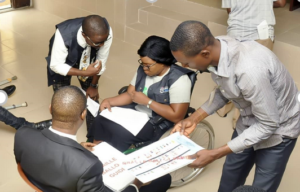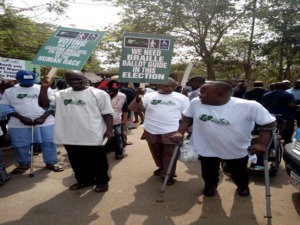Project
Data For Inclusion
-
Amount Funded
190,601 EUROProject Duration
01 May 2020 - 31 Mar 2021 -
-
Lead organisation
Inclusive Friends Association
-
The biggest success of Inclusive Friends Association (IFA) is that independent voting for voters with visual impairments is now possible for the first time in Nigeria’s election history. This took place in Osun where IFA designed and piloted the use of the braille ballot guides. At the 91 polling units where it was deployed to, there was a success rate of 94 percent. IFA also reviewed the training manual designed by the Independent National Electoral Commission (INEC) and meant for election officials to include the braille ballot guides as training materials. In addition, IFA made sure to include them as checklist items for elections which helped conduct the first accessibility audit of a polling unit that is led by people with disabilities. All of the above provided the basis for intervention in the electoral process and its recommendations are currently cultivated by Electoral Commissions in the 15 ECOWAS states.
-
Organisation
The biggest success of Inclusive Friends Association (IFA) is that independent voting for voters with visual impairments is now possible for the first time in Nigeria’s election history. This took place in Osun where IFA designed and piloted the use of the braille ballot guides. At the 91 polling units where it was deployed to, there was a success rate of 94 percent. IFA also reviewed the training manual designed by the Independent National Electoral Commission (INEC) and meant for election officials to include the braille ballot guides as training materials. In addition, IFA made sure to include them as checklist items for elections which helped conduct the first accessibility audit of a polling unit that is led by people with disabilities. All of the above provided the basis for intervention in the electoral process and its recommendations are currently cultivated by Electoral Commissions in the 15 ECOWAS states.
-
Project
The project titled Data for Inclusion is ensuring the increase of participation of persons with disabilities in Nigeria’s political and electoral processes by collecting disaggregated data of disabled people as well as influencing the reduction of physical barriers and stigma that make it difficult for PWDs to participate in elections. The project is supporting the collection of data of visually impaired persons in 12 states (2 in each geographical zone) and influencing the Independent National Electoral Commission, state governments in Edo and Ondo to use the data in providing ramps in polling units to make them accessible. IFA and its partners, the Network for the Advancement of Rights of Persons with Visible Disabilities (NAPVID) in Edo and the Ondo state Disabled Welfare Agency (ODWA) are recruiting PWD leaders in the 266 local governments’ areas (LGAs) in the 12 states to manually collect these data from local communities and also to set up a technological centre to electronically facilitate the collection of the PWD data from most of the urban centres. Massive media sensitisation programmes are being conducted to create awareness on how PWDs can send their data into the database. In the lead up to the governorship elections in both states, IFA and its partners will hold Live TV Manifesto debates for governorship candidates in Edo and Ondo states to provide an opportunity for PWD leaders to ask for inclusive policies from prospective governors. PWDs leaders in all the local governments in both states are being trained on issue-based approaches to prepare them for the debates. IFA and its partner also hold quarterly review meetings in four geographical locations and use lessons learnt in strengthening its strategy on the project.
-
-
The project titled Data for Inclusion is ensuring the increase of participation of persons with disabilities in Nigeria’s political and electoral processes by collecting disaggregated data of disabled people as well as influencing the reduction of physical barriers and stigma that make it difficult for PWDs to participate in elections. The project is supporting the collection of data of visually impaired persons in 12 states (2 in each geographical zone) and influencing the Independent National Electoral Commission, state governments in Edo and Ondo to use the data in providing ramps in polling units to make them accessible. IFA and its partners, the Network for the Advancement of Rights of Persons with Visible Disabilities (NAPVID) in Edo and the Ondo state Disabled Welfare Agency (ODWA) are recruiting PWD leaders in the 266 local governments’ areas (LGAs) in the 12 states to manually collect these data from local communities and also to set up a technological centre to electronically facilitate the collection of the PWD data from most of the urban centres. Massive media sensitisation programmes are being conducted to create awareness on how PWDs can send their data into the database. In the lead up to the governorship elections in both states, IFA and its partners will hold Live TV Manifesto debates for governorship candidates in Edo and Ondo states to provide an opportunity for PWD leaders to ask for inclusive policies from prospective governors. PWDs leaders in all the local governments in both states are being trained on issue-based approaches to prepare them for the debates. IFA and its partner also hold quarterly review meetings in four geographical locations and use lessons learnt in strengthening its strategy on the project.
-
The Inclusive Friends Association (IFA) believes that the full inclusion of people with disabilities (PWDs) in the electoral process is possible if everyone thinks and acts ‘Inclusion’ and if people work together to dismantle the social injustices that diminishes the human rights of persons with disability and create an inclusive world where everyone counts.

Its project “Data for Inclusion” aimed at ensuring the increase of participation of PWDs in Nigeria’s political and electoral processes by collecting disaggregated data of people with disabilities as well as influencing the reduction of physical barriers and stigma that make it difficult for PWDs to participate in elections.
In the drive to promote inclusion for PWDs in elections, IFA had a pre- election advocacy in Osun state before the 2018 off cycle governorship election in the state, where they met a patriotic Nigerian, Mr Joseph Oguniran. Mr. Oguniran always finds joy in exercising his franchise come every election irrespective of the situation surrounding the elections. He is a smart and intelligent school teacher at the Handicap Primary School Ikirun road, Osogbo. During the meeting with Mr Joseph, Ms Grace Jerry, the Executive Director of IFA asked him to share his voting experience in Osogbo, the capital city of Osun state.
Grace Jerry : How do you feel going out to vote amidst the electoral violence as a PWD?
Mr. Joseph: It is something I do with Joy; I even mobilize my people (PWDs), especially the blind to come out on the Election Day.
Grace Jerry: What is your experience like generally?
Mr Joseph: Well! like I said before, I enjoy going out there to vote but my own displeasure is the fact that we as the blind voters cannot vote without being assisted and most times no matter how literate and smart, we are, we always need to go with someone we trust otherwise we will be at the risk of being misled by party agents who are always willing to assist in favour of their party which could be against our wish.
For IFA, Mr Joseph`s story was an opportunity to add its effort in the race to make voting more accessible for the blind voters in Osun state and Nigeria at large. Coming back from the advocacy trip, it quickly included the need for Braille Ballot Guide in the agenda for its stakeholder roundtable meeting in Abuja and invited Mr Joseph to tell the story by himself in the presence of the stakeholders including INEC.
IFA engaged INEC Chairman and the National commissioners of the commission afterwards on one-on-one meetings to have their consent to the braille ballot guide idea that yielded positively after some couple of meetings, letter, email and phone calls. IFA also worked with the National Blind Association and Joint National Association of Persons With Disabilities (JONAPWD) at the state and national level to have their buy in and understand the need for this intervention.
The IFA team together with the President of the Network with the Advancement of Persons with Visible Disability (NAPVID) together facilitated the design of the braille ballot guide for INEC adoption. The intervention became a reality when the braille ballot guide was first piloted in Osun state to make the election process more accessible for the blind voter among others.

In achieving this IFA, carried out its first form of sampled data gathering of blind registered voters in Osun to assist INEC in deployment of the braille ballot guide in the sampled polling unit. IFA then mobilized and trained all blind voters from these sampled polling units on the use this braille ballot guide, asking them to go and do a step-down training to those that could not make to the training and developed a mechanism to monitor the step-down training. Afterwards, IFA carried out a rally in six states of Nigeria represent the six geographical zone requesting for the continuous use of the braille ballot in all elections.
The braille ballot guide was redesigned and deployed during the 2019 general election but the need for effective and efficient deployment of the braille ballot guide and other PWD assistive materials led to the data gathering of PWDs across Nigeria, an intervention funded by Voice with the campaign name “Data for Inclusion”.
The result of this intervention, the braille ballot among other assistive materials is included in INEC training manual and forms part of INEC material in every election in Nigeria as IFA observed the braille ballot in Edo and Ondo 2020 off cycle elections as well as the just concluded Anambra State governorship election with deployment plan being guided by the data served by IFA to INEC.
The project has gone a long way in contributing to the process of making it easier for PWDs to participate in the electoral process. The deployment of the braille ballot guide especially makes a big contribution for the visually challenged, making it possible to confidently participate in secret balloting.





